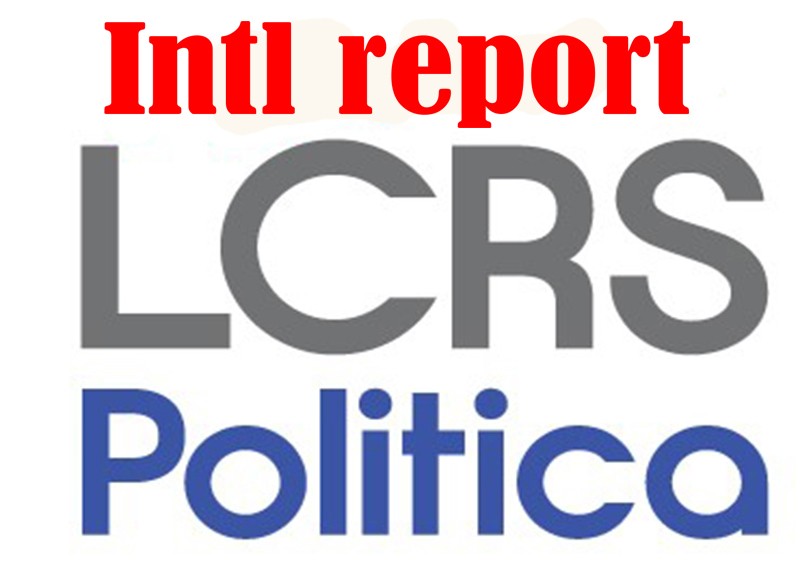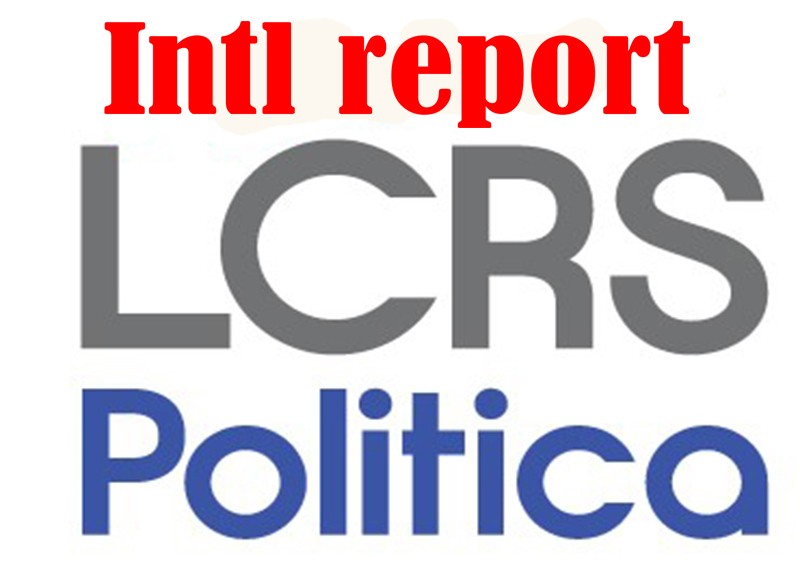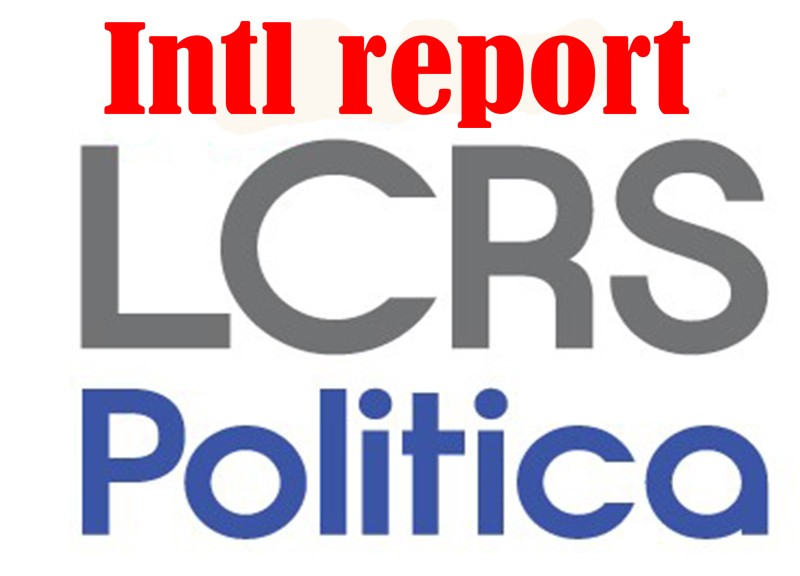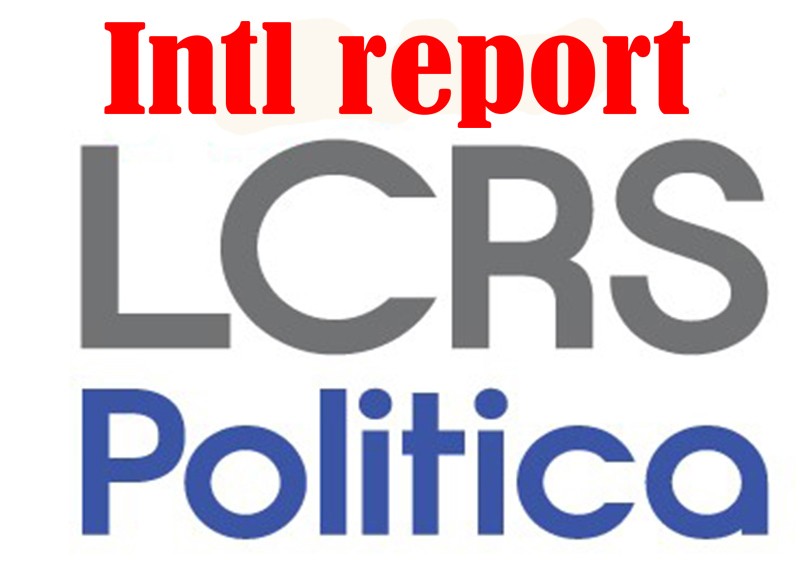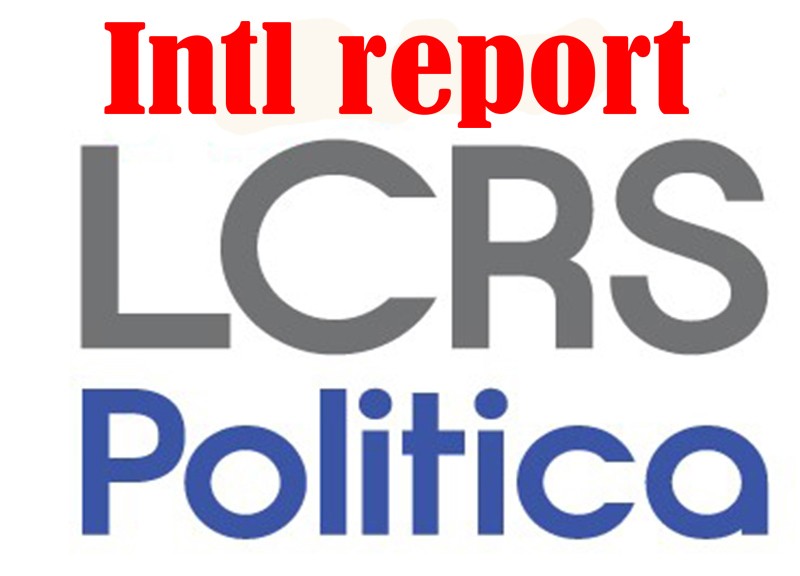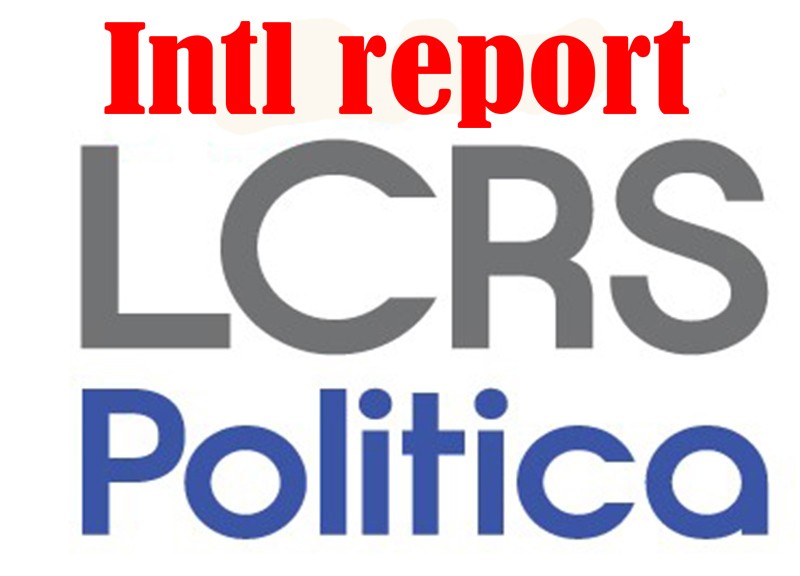
International Report 10 – June 4-10, 2020
The LCRS Political Team provides an analytical reading of the events in Lebanon, the region and the world.
- Introduction
On Lebanese affairs
This week was highlighted by what Patriarch Al-Ra’i said in his sermon on Sunday July 5, which some considered “as an out of the ordinary” because it included remarkable positions, including:
1- Lifting the blockade of Lebanese legitimacy,
2- Lebanon’s neutrality - meaning Lebanon’s withdraw from regional conflicts,
3- Implementing international resolutions.
The patriarch's position attracted the Lebanese and Arab public opinion, as evidenced came the visit of Saudi Ambassador Walid Al-Bukhari to Al-Diman on Monday, July 6, 24 hours after the sermon of the patriarch. A delegation from the Lebanese Forces also visited him, that included MPs Ziyad Al-Hawat, Shawqi Al-Dakash and Joseph Ishaq, and President Amin Al-Gemayel as well as President Saad Al-Hariri visited him.
At the end of the week, President Fouad Siniora visited Bkerke in the name of the "Al-Azhar Declaration Follow-up Committee", at the head of a delegation that included the ladies and gentlemen: Mona Fayyad, Muhammad al-Sammak, Khaled Qabbani, Antoine Masarra, Antoine Courban, Fares Souhaid, Radwan al-Sayyed and Khaled Ziyade.
The importance of the Patriarch's words lies in the following points:
- Exceeding the limits of Maronite leaders, who used to be cautious in dealing with the issue of the "Lebanon blockade" by Hezbollah, and appealing to President Aoun to "liberate the presidency" from this siege;
- Speaking of the necessity of neutrality of Lebanon at the moment of being involved in an axis that makes Lebanon a country attached to Iranian influence;
- Implementing international resolutions.
The question that arises today is whether the words of His Beatitude establish a new political path in Lebanon to confront Iran's tutelage?
To answer this question, the report suggests:
- The need to monitor everyone's reactions, especially the Aounist movement and the Hezbollah team.
- Monitor whether the words of the Head of Bkerke are complementary or coordinated with an international will, specifically the Vatican circles and the Apostolic Church.
- The report
The report team provides an analytical reading that will put in light the main events around the world.
- On Lebanese issues
The President of the Private Hospital Syndicate, Suleiman Haroun, stressed during a press conference on Tuesday, that there is a serious shortage of medical supplies, especially in basic and vital materials used for orthopedics and brain surgery and tilting the arteries of the heart, noting that "any machine that breaks down in any hospital cannot be repaired or changed." He stressed that hospitals are no longer able to continue to incur major losses, saying: "We are obliged in the next stage to limit hospital reception only to emergency cases, especially chemotherapy and dialysis, and cases that threaten the lives of patients, and this measure is a first stage, but it does not solve the problem." " Haroun also stressed that "hospitals cannot continue in this manner and without paying their dues", declaring that "we will give two or three weeks for officials to remedy the situation and then we will move to another stage and the natural plan will be to close hospitals completely except for chemical treatments and dialysis."
On an other hand, as part of the continuation of the smuggling campaign led by its militia to Syria, Hezbollah opened a new illegal crossing with the “neighbor” on Monday in the Bekaa region in eastern Lebanon, preparing to cross civilians, as the crossroad reaches the Zabadani area in the western Damascus countryside.
In the details, the militia equipped the crossing that was mainly present for military uses, and through which Hezbollah fighters pass from Lebanese territory to Syria. The road has been changed during the past days, allowing civilians to use it. The newly paved road falls within a geographical area that is not covered by the last radar point and a thermal control room installed by the British Army, and handed over to the Lebanese Army on the eastern border with Syria to monitor the border. In turn, field sources reported that the use of the newly opened road was previously limited to military uses, so that party fighters pass through it to Syria, while there are still unpaved military roads used by Hezbollah fighters in the mountains to cross into neighboring lands on the Lebanese eastern chain. On the other hand, information, according to residents of that area, confirmed that the militia would pass aid convoys from Syria through the crossing in case the Bekaa region suffers from a shortage of food due to the economic and financial crisis. The opening of the crossing comes at a time when Lebanon is boiling over the presence of illegal crossings that backup smuggling operations to Syria, and through which diesel, flour and medicines pass through.
On the international level, US Secretary of State Mike Pompeo stressed on continuing "the implementation of the sanctions imposed on terrorist symbols, including Hezbollah," expressing his rejection of Hassan Nasrallah's proposal to import Iranian oil, which is subject to US sanctions. Pompeo stressed that the United States continues to pressure Hezbollah and assist the Lebanese people in forming a successful government that will implement the necessary reforms, and that Lebanon will not be a proxy for Iran.
At the end of the week, the Maronite Patriarch Cardinal Mar Bechara Boutros Al-Ra’i received, in the patriarchal edifice in Bkerke, a delegation from the “Follow-up Committee of Al-Azhar Conference” headed by President Fouad Siniora. The delegation presented to the Patriarch a document “for the sake of a comprehensive national dialogue”. President Siniora announced before his departure: we support the words of the patriarch, launched it in his sermon on Sunday, and we demand the lifting of the detention of Lebanese legitimacy and affirm the Islamic - Christian coexistence and the civil peace.
Political and economic events:
- The Maronite Patriarch Bechara Al-Ra’i: The people will not kneel down and we appeal to the president to work to lift the siege on legality and the free national decision. (Sunday, June 5, Sermon)
- The Industrialists Association declares "the state of industrial emergency": to close all illegal institutions.
- Hezbollah Secretary-General: Announces the start of industrial and agricultural resistance... And for the American administration: Your policy of strangling Lebanon will strengthen Hezbollah
- A joint statement from the “Lady of the Mountain meeting” and the “National Initiative Mouvement”: a joint program and plan for the battle to bring down Power.
- The “National Initiative Movement” warned Hezbollah against any war adventure, placing itself at the service of the Iranian project.
- The Cabinet approved the appointment of 3 inspectors to the Judicial Inspection Authority and to renew the contract with observer doctors at the Ministry of Health.
- The head of the Phalanges Party (Kataeb), MP Sami Al-Jameel, said in an interview with Al-Jadeed TV, that "the United States is in conflict with Iran and Lebanon has nothing to do in this conflict", noting that "Lebanon was not besieged until Hezbollah placed its hand on the country and put Lebanon's official position in confrontation With the international community”. He believed that "Hezbollah is fighting battles with the whole world, and of course it will respond to it. Hezbollah has implicated the Lebanese in its struggles because it uses the Lebanese state and people as a shield in its battle with the West in defense of Iran, not Lebanon". He pointed out, "the one who encroached upon Lebanon is the one who isolated it by force and prevented it from obtaining support from all countries of the world". He said, "Lebanon is a hostage in the hands of Hezbollah, stressing that the solution is not to escape forward and isolate ourselves, but rather that the state regain its sovereignty and its decision and set borders for Hezbollah and distinguish itself from it and open up to the international community because the Lebanese people cannot bear the place where Hezbollah put the Lebanese in".
- On Syrian Issues
The Syrian Observatory for Human Rights said, Thursday, that American forces turned an agricultural airport in Al-Yarubia countryside (Tel Kujer) east of Hasaka into a military base. And at this base, American forces established a landing pad for helicopters and cargo planes. The new base was also fortified with concrete blocks and earthen mounds. The observatory had spoken about the entry of an American convoy into north-eastern Syria, through the Al-Waleed Crossing coming from the Kurdistan region of Iraq, and the convoy went to the city of Al-Shaddadi in the countryside of Hasaka, then proceeded to the base of Kasrak.
Diplomatic sources said on Wednesday that, Russia has informed its partners in the United Nations Security Council that it only wants one border entry point for humanitarian assistance, provided by the United Nations to the population in northwestern Syria, for a period of six months exclusively. A diplomat told AFP, on condition of anonymity, that the Russians said “(they want) one entry point for six months on the Turkish border”. Another diplomat emphasized that "the negotiations are complicated. Russia is talking about only one entry point", while a third diplomat, speaking on condition of anonymity as well, said that “the Russians talked a lot in the past about stopping the mechanism of transporting cross-border aid”.
This aid transfer mechanism, which has been in place since 2014, does not require any authorization from Damascus, and it expires on July 10. Germany and Belgium, which are responsible for this file, have started negotiations to extend it. A draft resolution submitted by the two countries includes maintaining the two current points of entry through Turkey into Syrian territory for a period of one year, in response to a request submitted by the United Nations Secretary-General Antonio Guterres on June 23.
On an other hand, the Syrian regime signed what was described as a military and security agreement with Iran, according to Iranian media that did not disclose many details of that agreement. On Wednesday, the official Iranian agency, Fars, reported that the Iranian Chief of Staff, Major General Mohammad Bagheri, and the Minister of Defense of the Syrian Regime, General Ali Ayoub, signed an agreement that included military and security cooperation between the two systems. In turn, the pro-Assad Syrian "homeland" quoted on its website the Iranian chief of staff as saying that the Iranian regime will support and strengthen air defense systems in Syria. The Iranian Chief of Staff, who arrived in Damascus on Tuesday evening, confirmed in a brief press conference that he held with Ayoub, after they signed the agreement on Wednesday morning, the agreement included strengthening the air defense systems.
Bagheri said that the military agreement with Assad will include all forms of military cooperation, while details of the security agreement was not disclose, which is usually linked to non-combat intelligence institutions.
- On Libyan issues
The Syrian Observatory for Human Rights revealed the high rate of Syrian recruitment by Russia in the areas of influence of the Syrian regime, and dumped them as "mercenaries" in military operations on Libyan territory alongside the "Libyan National Army" led by Field Marshal Khalifa Haftar. The Observatory reported that the recruitment process continues to escalate in Daraa, As-Suwayda, Homs, Al-Hasakeh, Hama and Deir Al-Zour, and that Moscow is taking advantage of the financial crisis and poor living conditions to recruit Syrians. According to the observatory, the number of conscripts who have arrived in Libya has reached 2,700 mercenaries to the date, and the individual is receiving from Russian security companies a monthly sum of up to $ 1,000. Recruitment numbers increased dramatically from 900 mercenaries at the end of May to 2,700 by the end of June.
The newspaper "The Independent" indicated in a report that Russia used with its ally, Field Marshal Haftar, the recruiting of the Syrians after they realized that they were losing the war, and that the shipment of Syrian fighters paid off and the balance of the battle overturned in the battles in Tripoli, the city of Tarhuna and the National base. And indeed, the Kremlin-linked military companies have begun recruiting youth in areas controlled by the Syrian regime, and a former ”Wagner” member stated that Moscow sent Syrians to Libya for the first time in 2019.
A source told "Reuters" that the pace of recruitment increased with the intensification of the fighting in Libya and the calm of the war in Syria, and that the training of fighters takes place at Homs base before they fly to Libya from the Russian Hmeimim base.
For his part, Joshua Landis, head of the Center for Middle East Studies at the University of Oklahoma, said: "Russia and Turkey are working to increase the number of equipment for each of them in Libya, where the European role comes after them. Russia tried to match Turkey's effort to send Syrian mercenaries, but it achieved mixed results." A secret report prepared by the United Nations last May revealed that “Wagner” has more than 12,000 fighters in Libya, when the Russian state had denied that it has forces in Libya, and Russian President Vladimir Putin said that if there are Russians in Libya, they do not represent the Russian state and they are not paid by the state. United Nations experts, who are investigating violations of the arms embargo, believe that between January 1 and March 10, there were 33 flights of “Cham Wings” from Damascus to Benghazi, possibly to transport mercenaries.
It is noteworthy that the number of Syrian mercenaries that Turkey sent to fight alongside the National Accord government exceeded 6000, according to the "Independent" report.
Meanwhile, hundreds of Libyans had demonstrated in Benghazi, eastern Libya, in an expression of their rejection of what they described as the Turkish occupation of parts of their country, in reference to Turkey's support for the internationally recognized Libyan government of reconciliation that dominates the West. The demonstrators raised slogans condemning Turkey and the government of reconciliation and slogans in support of the forces of eastern Libya (the Libyan National Army) led by Khalifa Haftar.
In this context, Egyptian President Abdel Fattah Al-Sisi was informed, on Sunday, over the Egyptian army plans to secure the western depth of the country to the borders with Libya during a meeting with a number of leaders of the armed forces. Al-Sisi met with the Director of the Signal Weapon of the Egyptian Armed Forces, Tareq Al-Zahir, the Chairman of the Satellite Committee, Mohamed Al-Bashari, the Chairman of the Military Mobile Committee, Amr Farouk, and the Chief of Staff of the Signal Weapon for Systems and Networks Muhammad Saeed Musaad and a number of state officials. According to a statement issued by the Office of the Presidency of the Republic, he discussed the developments and the conditions of the border outlets and secured them in full, in cooperation and coordination with the competent government agencies using the technology of modern mobile and visual communication systems and the Egyptian satellite "Tiba 1". Al-Sisi had warned that the advance of the pro-Turkish forces' of the Libyan government, would push his country into direct intervention in Libya.
- On Palestinian-Israeli issue
On Tuesday, the foreign ministers of Egypt, France, Germany, and Jordan announced that any annexation of occupied Palestinian lands would violate international law and threaten the foundations of the peace process.
The Israeli newspaper "Jerusalem Post", on Wednesday, quoted an American official, whose name has not been released, as saying that the American peace team will meet today, while there was no statement from the White House, regarding these consultations. The chief adviser to the American president and son-in-law Jared Kouchner is heading the team, which also includes the US special envoy to the Middle East, Avi Berkowitz, and the US Ambassador to Israel David Friedman, who is in Israel. The team had held consultations at the end of last month, but it ended without a final decision.
Berkowitz left Israel, on Friday, after he held talks with Israeli officials led by Israeli Prime Minister Benjamin Netanyahu. The newspaper quoted the American official as saying that the American team is planning a series of discussions after Berkowitz's visit to Israel. He added that a decision on annexation "is still possible this month."
And it seems that, Netanyahu wants a green light from the United States of America, before embarking on the annexation process, which he plans to start on the first of this month, as the alleged century deal allows Israel to annex about 30% of the West Bank. But the US administration requires the approval of Netanyahu and both Defense Minister Benny Gantz and Foreign Minister Gabi Ashkenazi before embarking on the annexation process.
- About the COVID-19 virus in the world
The World Health Organization remains skeptical about what hundreds of scientists had revealed on that the virus is circulating in the air. While on Sunday 5 July, 239 scientists from 32 countries sent a message stating that the virus can be transmitted through the air through small particles and can spread the infection. The scientists who signed the letter called on the international organization to review its recommendations regarding safety measures from Corona, according to a report published by the New York Times. The newspaper pointed out that the message, which the scientists supported with evidence, will be published by a scientific magazine next week.
The World Health Organization said in its latest update on the developments related to the virus at the end of last month, that the virus cannot be transmitted through the atmosphere before it has been scientifically proven, noting that it is transmitted through drops of less than 5 microns.
If this hypothesis is proven, the report states that all health agencies in all countries should review the protocols followed, whether they are inside medical facilities, related to protective clothing and medical masks used, or with regard to dealing with infected cases and those present in the home quarantine, and even with regard to wearing masks in public areas, as this means that the virus can be transmitted indoors with recycled air. What evidence provided by scientists means, if adopted, to reconsider the ventilation systems in schools, homes, companies and homes for the elderly, and the use of special filters, some of which may contain UV-sterilized lighting to kill floating particles in the air.
The director of the Institute of Infectious Diseases in the United States, Anthony Fuchi, told Fox News last April that the virus could in fact be transmitted between people who are just talking, not just when they cough or sneeze.
Current studies indicate that it is difficult for the emerging virus, to be transmitted through the air, and the WHO still suspicious of its being stuck in the air, or to move beyond just a meter away, but an infectious disease specialist has questioned this hypothesis.
The American Academy of Sciences sent a letter to the White House in April saying that four studies tend to transmit the virus through the air released by the breathing of individuals and not only through drops caused by coughing or sneezing near one of them or that are attached to surfaces where the virus can survive for hours and days according to The material that made this surface.
As of Thursday morning, there were more than 12 million and 180,000 cases of coronavirus (COVID-19), 552,394 deaths, and 7 million and 81,000 recovered.
- On American issues
On Wednesday, US Secretary of State Mike Pompeo condemned the killing of Hisham Al Hashimi, an Iraqi journalist and researcher specializing in terrorist groups. Pompeo said in his speech, that "Iraq has lost a journalist who stood by the aspirations of the Iraqi people, who received threats (before his assassination) by groups loyal to Iran." Pompeo added that the United States is joining the rest of the world in condemning the assassination of Hashemi, calling on the government of Iraq to bring the guilty to justice quickly. Pompeo also condemned the Russian and Chinese veto, which the two countries have used in recent months to support the Assad regime, while at the same time condemning the policies of the Syrian regime that prevented the flow of food, which exacerbated the humanitarian situation on the ground. Pompeo pointed out in his speech to the United Nations affirmation last week, of the dependency of arms shipments to Iran, which were on its way to Yemen during last November and February, also referring to another ship that was seized on June 28, which was carrying RPGs, Kalashnikovs and anti- tank missile. In Sudan, Pompeo announced $ 365 million in financial aid to support the democratic transition there, including $ 85 million to combat the Corona virus. On the World Health Organization, Pompeo said that the administration of US President Donald Trump had notified Congress of withdrawal from the World Health Organization, explaining that "these were the president's intentions, and we did it in a formal way." "The president made it clear that we would not fund an historically ineffective organization," Pompeo added, because of its failure in Wuhan - where the Coruna virus was first spread - and the organization's inability to carry out its mission to prevent a global pandemic. Pompeo continued, "Do not forget history, this institution was mistaken when the outbreaks of SARS and Ebola, and the United States had to create its own system of solutions for AIDS, this organization has a history of corruption and politicization." Pompeo concluded the conference by talking about China, affirming that the United States continues to assess the risk of Chinese companies on the information of American citizens, and ensure that the Chinese Communist Party does not have access to it, and the need to protect infrastructure based on Western ideals to protect information and intellectual property.
- On Iraqi issues
A maelstrom took over the Iraqi demonstrators in Tahrir Square in central Baghdad, in response to the assassination of the Iraqi political researcher Hisham Al-Hashimi, who was killed by gunmen in front of his house in Baghdad on Monday evening. The demonstrators held pictures of Hashemi, banners and pictures of Iran's guide, Ali Khamenei, stained with blood, and signs bearing the words "Khamenei is a murderer and his militia is the people of falsehood." Fingers are accused of killing Hashemi at Iranian-backed militias.
For his part, Iraqi Prime Minister Mustafa al-Kazimi said on Tuesday that Iraq will not settle until the killers of the security analyst and former advisor in the Iraqi government, Hisham al-Hashemi, are brought to justice for their crimes. Al-Kazimi added, according to what the Iraqi News Agency quoted on Telegram: "Those who are involved in Iraqi blood will face justice and we will never allow chaos and mafia policy."
And Iraq lives these days due to the repercussions of the assassination of the Iraqi security expert, which caused a great shock among the Iraqis, especially since the deceased was tweeting about an hour before his assassination, at his expense on Twitter, talking about the situation in Iraq. The Iraqi Foreign Ministry said on Twitter that Foreign Minister Fuad Hussein sent a message to his European counterparts to urge them to reject the European Commission's decision to include Iraq in the list of high-risk countries regarding money laundering and terrorist financing. Foreign Ministry spokesman Ahmed al-Sahaf said in a statement that the minister has sent a message to his European counterparts, stressing that "Iraq has implemented over the years important laws and measures aimed at combating money laundering, terrorist financing, and mitigating the risks associated with it." The Financial Action Task Force (FATF) report indicated that the AML / CFT safeguards in Iraq are strong, and well established, according to the statement.
The Arab Parliament condemned the assassination of the Iraqi political researcher, Hisham Al-Hashemi, calling for supporting the measures taken by the Iraqi government to restrict weapons to the state. The President of the Arab Parliament, Dr. Mishaal bin Fahim Al-Salami, stressed his support for the efforts and measures taken by the Iraqi government aimed at collecting weapons and making it exclusively in the hands of the state, to achieve security and stability and impose the rule of law.
- On Yemeni affairs
The legitimate Yemeni government has accused Iran of using fishing vessels in Yemeni territorial waters as a camouflage and as a cover for smuggling weapons, ballistic missiles and drones for the Houthi militia.
In details, the Yemeni Cabinet, in a virtual meeting held on Monday evening, expressed its condemnation strongly of the hostile activities carried out by Iranian ships in the Yemeni regional waters repeatedly from bulldozing fish resources and shooting incidents on Yemeni fishing boats and fishermen, and using these ships as a cover for arms smuggling To the Houthi militia. He also called on the United Nations and the permanent members of the UN Security Council to condemn these hostile activities and to pressure the Iranian regime to stop its practices as a violation of Yemen's sovereignty, security and stability.
On the other hand, the Chinese embassy in Yemen expressed, Tuesday, its concern about the status of the floating oil tank, "Safer", which is anchored off the coast of Yemen, while the Houthis prevent its maintenance. The Chinese embassy in Yemen wrote on her account on Twitter: "We are concerned about the situation of the out posting tank." It added: "If any problem occurs to the tank, it will harm the life and live hood of Yemeni fishermen and civilians in the coast and will affect marine navigation and lead to severe marine pollution." It called for "taking measures to find a solution before the crisis erupts." The "Safer" floating ship, which is described as a "time bomb", is docked 7 kilometers off the Ras Issa port in the city of Hodeidah, which is controlled by the Houthis, and has a million and 140 thousand barrels of crude. The ship has not undergone any maintenance since 2014, as the Houthi coup disrupted the routine and periodic operation that the ship's staff and engineers used to perform periodically and exceptionally when needed. “Safer” is exposed to corrosion due to the salty sea water, and there is the possibility of exploding at any moment due to the escalation of gases from inert crude oil for years. Over the past two years, fears of a possible explosion have increased, thus more than a million barrels of oil could leak into the water.
- On Egyptian affairs
The Prime Minister of Ethiopia, Abi Ahmed, stressed that "our dispute with Egypt over the operation and the period of filling the Renaissance Dam will be resolved at the African House." He said: "We will not harm Egypt, and we will start filling the dam to take advantage of the heavy rainy season." The Ethiopian Prime Minister added, "We will not deprive Egypt of water and we will reach an agreement soon." On Sunday, the Egyptian Minister of Water Resources, Dr. Mohamed Abdel-Atti, affirmed that the Egyptian proposal in the Renaissance Dam negotiations would achieve the Ethiopian goal in generating electricity, while avoiding serious harm to Egyptian and Sudanese interests. He added that the proposal comes within the framework of implementing the Declaration of Principles as well as the method of dealing with any future projects on the Blue Nile, in a manner that ensures their consistency with the principles of international law related to the use of common rivers.
During his meeting Sunday with observers and experts in order to review the Egyptian position regarding the filling and operation of the Ethiopian Renaissance Dam, the Minister affirmed that Egypt had addressed the technical and legal aspects with the observers and clarified the Egyptian concerns about the various aspects of the agreement to fill and operate the Renaissance Dam in the context of an attempt to bring the views between the three countries Which the course of negotiations proved to be very different.
- On Iranian affairs
The leaked terms of the cooperation agreement between Iran and China for 25 years caused a wide controversy, as they contained paragraphs that include granting islands and military and air bases to China in exchange for investing in all economic, security and military sectors in Iran, and paying sums to Tehran for buying Iranian crude. The agreement also stipulates that China would participates in "developing the Jask port, participating in the construction of an industrial city, participating in building refineries, petrochemical industries, steel and aluminum, and building tourist cities on the coast of Makran, located on the shores of the Sea of Oman." But the Iranian Foreign Ministry denied, on Wednesday, by its spokesman Abbas Mousavi, the truth of this news, saying via "Twitter" that "the comprehensive action plan for the partnership between Iran and China is a clear road map and a leading guide for relations between the two countries in the future. Where China as a leading economic power in the world in the near future and Iran as a great power for the West Asia region can bear The bullies of traditional Western-dominated powers for a complementary relations. Mousavi denied granting Iranian islands or the presence of foreign forces in the cooperation agreement with China, describing them as “delusions and lies”. For his part, the director of the Iranian President’s Office, Mahmoud Wazi, said that the agreement with China does not includes articles binding for Iran, accusing foreign media of trying to "sabotage Iranian-Chinese relations." The secretariat of the Supreme Council for Free and Economic Trade Zones in Iran also denied the authenticity of the reports that talked about granting Kish Island in the Gulf to China. But former Iranian President Mahmoud Ahmadinejad revealed late last month what he described as "clauses of the secret agreement", which he said "they have being negotiating behind the back of the Iranian people for a 25 years deal with a foreign country”, when he referred to talks between Tehran and Beijing to conclude a cooperation agreement between Iran and China for 25 years. For his part, “Oil Price” published a report on Monday about the content of the agreement, and stated that Iran would grant the oil, gas, petrochemical, transportation and even military industries to China. The site stated that one of the secret elements of the deal signed last year is that China will invest 280 billion US dollars in developing the oil, gas and petrochemical sectors in Iran, as China will pay this amount in advance in the first five years of the new 25-year deal. There will also be another investment of $ 120 billion, with advance payment also in the first five-year period, to develop transport and industrial infrastructure in Iran, and the extension will be made in each subsequent period if the parties agree.
In exchange for that, first of all, Chinese companies will be given the first option to bid on any new, stalled, or incomplete projects - for oil, gas, and petrochemicals in Iran. China will also be able to purchase all oil, gas and chemicals products with a minimum 12% discount for the six-month average price of the products. In addition, China will be given the right to delay payment by up to two years, and more importantly, it will be able to pay in soft currencies by doing business in Africa and the countries of the former Soviet Union. According to "Oil Price", "given the exchange rates associated with converting these soft currencies into hard currencies that Iran can obtain from its friendly western banks." The report stressed that China will get a total discount of about 32% when purchasing Iranian oil, gas and petrochemical products.
On the issue of explosions, the Islamic Republic of Iran News Agency reported, Tuesday, that two people were killed in an explosion in a factory south of the capital, Tehran. A local official said, "A human error caused an explosion in one of the factories, two people were killed and three others wounded."
The Iranian authorities confirmed that two people were killed and 3 wounded in an explosion in a company in Baqshahr area, south of the Iranian capital, Tehran, in the early hours of Tuesday morning.
- On European affairs.
The United Kingdom announced on Monday the imposition of sanctions on 49 people and organizations as part of a new mechanism set up to punish human rights violations. The blacklist of entities and individuals whose assets will be frozen in the UK includes 20 Saudis suspected of having played a role in the assassination of Saudi journalist Jamal Khashoggi, as announced by the British Foreign Office. The list also includes 25 Russians accused of involvement in the death of lawyer Sergey Magnitsky in prison in 2009 after he revealed illegal acts. Magnitsky had passed away at the age of 37 in 2009 while in pretrial detention. He was detained on charges of tax evasion after he uncovered a massive corruption network while working in the tax affairs department of a Moscow law firm. Moscow has vowed to respond to what it called "hostile" sanctions, and the Russian embassy in London said in a statement that " Russia reserves the right to take retaliatory measures linked to the hostile decision." British Foreign Secretary Dominic Rapp described to the lawmakers these sanctions as a "means of targeting the perpetrators of (human rights violations) without punishing the people of a country on a wider scale." This mechanism allows Britain, which is a financial center through which is transfered or placeed the largest wealth in the world, and to adopt sanctions related specifically to human rights and independently of the United Nations and the European Union. The imposition of these sanctions is a precedent for the United Kingdom since its exit from the European Union last January. "This will allow the UK to work independently with allies such as the United States, Canada, Australia and the European Union," the British Foreign Office said.





